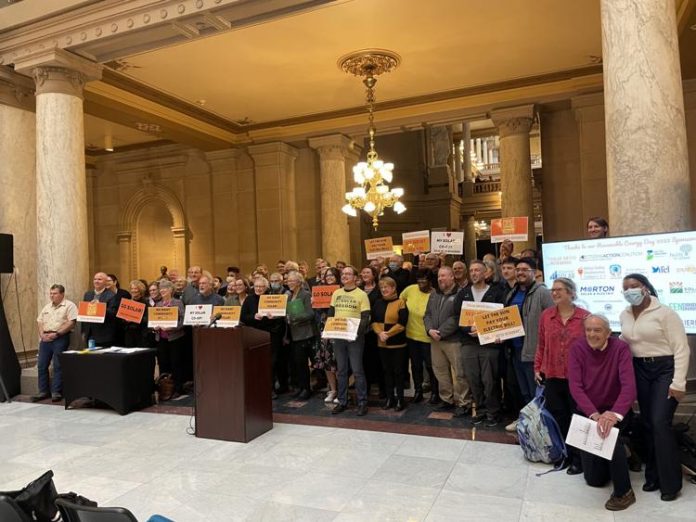Renewable Energy Companies Say State Policies, Utility Companies Have Limited Their Growth
- By John Asplund, TheStatehouseFile.com
- Â
Green energy companies and environmental organizations from across the state joined together at the Indiana Statehouse last week to promote the development of renewable energy in Indiana. Green energy companies and environmental organizations from across the state joined together at the Indiana Statehouse last week to promote the development of renewable energy in Indiana.
The Environmental Energy Network held a prayer vigil service Thursday morning, followed by a gathering where attendees had the chance to talk with company owners.
To conclude the day, three speakers aired their complaints with Indiana’s current renewable energy policies and suggested ways to fix them. This included their goals to save money on energy expenditures and create more educational and job opportunities for students and workers in the industry.
Bob Rice, energy manager of Hamilton Southeastern Schools, said he can greatly reduce the cost of the district’s utility bills by installing renewable energy, adding the district has gone overboard on spending money on electric bills to support the vast amount of school property.
“As a district, Hamilton Southeastern Schools serve nearly 24,000 students daily on 22 campuses. We have over 4 million feet of the facility … To power those schools, we consume over 35 million kilowatt hours a year and $3.5 million,†said Rice.
In 2019, Rice said agency schools installed 4,800 solar panels on three of its facilities.
“This year I estimated if we had not been solar at those schools, that utility bills would be around $375,000 to power those three schools, but with solar, the electric bill was only $67,0000,†Rice said.
The development of renewable energy also provides educational benefits for students in the STEM curriculum, he said.
“Solar rays have become an educational driver, and students are helping learn about renewable energy, promoting electrical engineering sustainability in the STEM curriculum. These rays are helping inspire the next generation of engineers and legislators that will help shape the energy and future of Indiana and the country,†said Rice.

Photo by John Asplund, TheStatehouseFile.com.
Environment groups and renewable energy companies called on the state’s legislature to make it easier for producers of solar panels and similar enterprises to operate in Indiana.
Photo by John Asplund, TheStatehouseFile.com.
Cross Roads Solar, a company from South Bend, produces solar panels with a goal to create jobs and life skills for “people who have made mistakes.†As CEO of Cross Roads Solar, Patrick Regan said utility companies’ limitations on the development of renewable energy makes it harder for people to buy his products.
“As a manufacturer, I could produce a lot more jobs if this state would have a lot more policies with regards to energy,†said Reagan.
The session wrapped up with Rep. Matt Pierce, D-Bloomington, who said renewable energy companies are having a hard time starting projects because the utility companies aren’t that interested.
“So the things that frustrated me in the energy task force is when the recommendations came out. It simply said, Oh, you can do community solar already under existing law. And by the way, if you do it, you should think really hard about how it impacts the ratepayers,†said Pierce.
Pierce will continue to fight restrictions on renewable energy companies, he said.
“We just gotta keep fighting. I pledge that as long as I’m around this building, I will keep trying to correct these poor energy policies we have today and get laws on the books to promote the zero carbon energy policies,†said Pierce.
John Asplund is a reporter for TheStatehouseFile.com, a news website powered by Franklin College journalism students.





